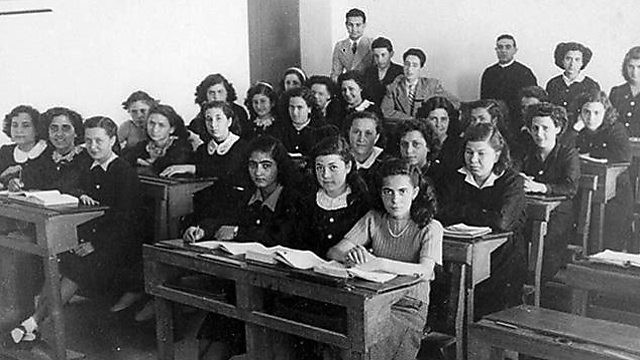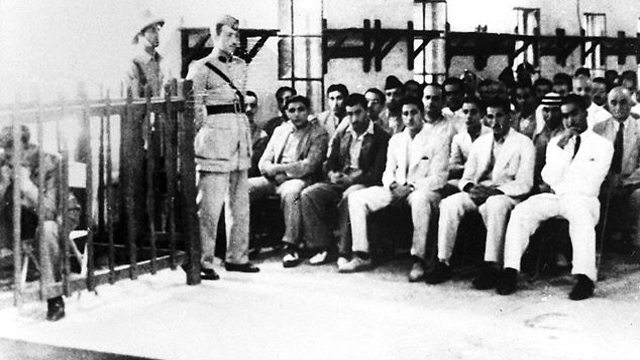Some quarter million Jews emigrated from Arab countries in the years surrounding 1948, with the establishment of the State of Israel. Most came to Israel and helped build the country, but thousands more immigrated to other countries and established Sephardic Jewish communities, sometimes in unusual places.
A study conducted by Beit Hatfutsot on behalf of Ynet sheds some light on the matter. Jews began leaving Arab countries even before the establishment of Israel, and more left as the conflict between the Arab countries and the nascent Jewish state intensified.
From some countries, the process was quick and most of their Jewish population left within a few short years. But in others, it was a drawn out process in which the Jews left in various waves.
The bottom line is that of the million or so Jews who lived in Arab countries in 1947, only a few thousand are left today. Hundreds of years of history disappeared, almost instantaneously.
From sunny North Africa to snowy Quebec, or the Amazon
As opposed to most Moroccan Jews who left quietly, Jews of other countries did not have such an option. In Yemen and Iraq, most Jews left in operations organized by the State of Israel, often with the assistance of local Zionist movements. Many of those who did not join the mass exodus were left behind until this very day.
For most Jews, Israel was the natural and preferred destination. The excitement stemming from the very establishment of an independent Jewish state in the land of Israel was immense and was articulated the realization of generations of longing and prayers for the return to Zion, out of a desire to be part of the Zionist enterprise.
There were other factors as well, often personal. Those who had family members who were already settled in other countries and were capable of financially supporting their relatives, often joined them instead of immigrating to Israel.
In addition, wealthy or well-educated families, such as those who mastered English or French or had professions that would enable them to easily integrate into western countries, often preferred to immigrate to countries other than Israel, at least initially.
The 6,000 or so Jews who lived in Libya in 1967 were transported to Italy due to the dangers they faced following the 1967 Six-Day War. Most of them then immigrated to Israel.
Some Jewish communities from Arab lands left and settled in other countries long before the State of Israel was established. Jews from Morocco settled in the Amazon in northern Brazil and Peru during the 19th century rubber boom.
The Sephardic community in the Canadian province of Quebec numbers some 25,000 today, mostly in Montreal. Many Jews left Morocco in the late 1950s and as French speakers found a home in the French-Canadian province.
Emigration en-masse or in waves
Jews from Syria settled in various communities in Latin America, such as Mexico City, Buenos Aires, Sao Paulo and Panama, around the turn of the 20th century.
There were also communities of Jews from Iraq who settled in India and the Far East, or in England, where Yemenite Jews from Aden settled.
In most of the places where the Jews settled they established a traditional synagogue and made an effort to preserve the religious and cultural customs from their land of origin. Their customs served as an anchor to preserve their identity among the subsequent generations.
As for language, many Jews spoke a unique Jewish-Arabic dialect which was different from that of Jews from other locations. The Baghdad dialect was different from that of the Jews of Tunis or Yemen.
In countries that were colonized by France, many Jews adopted the French language. Many of those locations had Jewish schools founded by the Alliance Israélite Universelle, a Paris-based international Jewish organization founded the French statesman Adolphe Crémieux to safeguard the human rights of Jews around the world.
Most first-generation emigrants continued speaking their native language, at least at home. In Israel however, there was immense pressure to learn and adopt Hebrew. Arabic speakers were also viewed with suspicion, as it was this language of the enemy. Consequently, most first generation immigrants abandoned their mother tongue, aside from a few words and expressions, and failed to pass it on to the next generation.
In general, Jews who immigrated to Latin America adopted Spanish (or Portuguese in Brazil) and Jews in the United States adopted the English language. In recent years, there has been a renewed interest by many in the language of their ancestors and some have begun using the languages spoken by their parents or grandparents in their origin countries.
While most Yemenite Jews immigrated en masse to Israel, Jews from Egypt dispersed around the world. More than 15,000 Egyptian Jews settled in South America, the reason being that Egyptian Jews left in a number of waves, influenced by a variety of factors affecting the community as well as the connections formed with the different destination countries over the years.
The Jews who remained in Egypt for financial reasons lost all, or most, of their possessions when Nasser nationalized the property of the wealthy in 1961. Following Egypt’s defeat in the Six Day War, there were anti-Jewish disturbances and all but 2,000 Jews left the country.
There are many Jews of Tunisian or Moroccan origin in Israel, but most Algerian Jews settled in France; some 130,000 compared to only 30,000 who chose to settle in Israel. In France, the Jews mostly settled in Marseilles, Paris and Strasbourg. Algeria was distinct from the other North African French colonies in that it was like France proper and its Jews carried French citizenship.
Dr. Yosef Sharvit, a lecturer at Bar Ilan University and an expert on Algerian Jewish history, explains that Algerian Jews were the only ones among the Diaspora communities to be criticized for not immigrating en masse to Israel.
Shami and Halabi
The Jews of Syria can be divided into two separate communities: the Jews of Damascus (Shami) and the Jews of Aleppo (Halabi) and each have their own traditions. Jews from Aleppo began immigrating to Mexico in 1912 and established the Magen David synagogue and community. Those that remained in Syria were more inclined to Zionism and many moved to Israel before 1948, some even as early as the 19th century.
Many Syrian Jews left the country during the 19th century due to a deteriorating economy. The opening of the Suez Canal eliminated the traditional land routes for trade and affected many Jewish businessmen. At first, many Jews moved to Beirut (then still part of the Syrian province of the Ottoman Empire) and from there to Egypt where the economy was boosted by the canal, before leaving to western countries.
Those that remained in Syria after 1948 had difficulty leaving the country. Only in 1992 did the Assad regime allow Jews to freely emigrate, and most left.
Iraq had one of the most ancient Jewish communities in the world. In 1948, the community was relatively prosperous and had a profound impact on the local culture and many did not think of leaving. But after Israel’s declaration of independence, Iraq sent troops to fight alongside the invading Arab countries and anti-Jewish sentiments soared. Local Jews were persecuted, blackmailed and many were accused of espionage and fired from civil service jobs.
The Iraqi government allowed Jews to emigrate, mistakenly believing that only a handful would leave, but most of those who left lost much of their property. About half of those who remained eventually settled in London. When Saddam Hussein came to power almost all of the remaining Jews fled to Iran (under the Shah) and then to Israel.
























